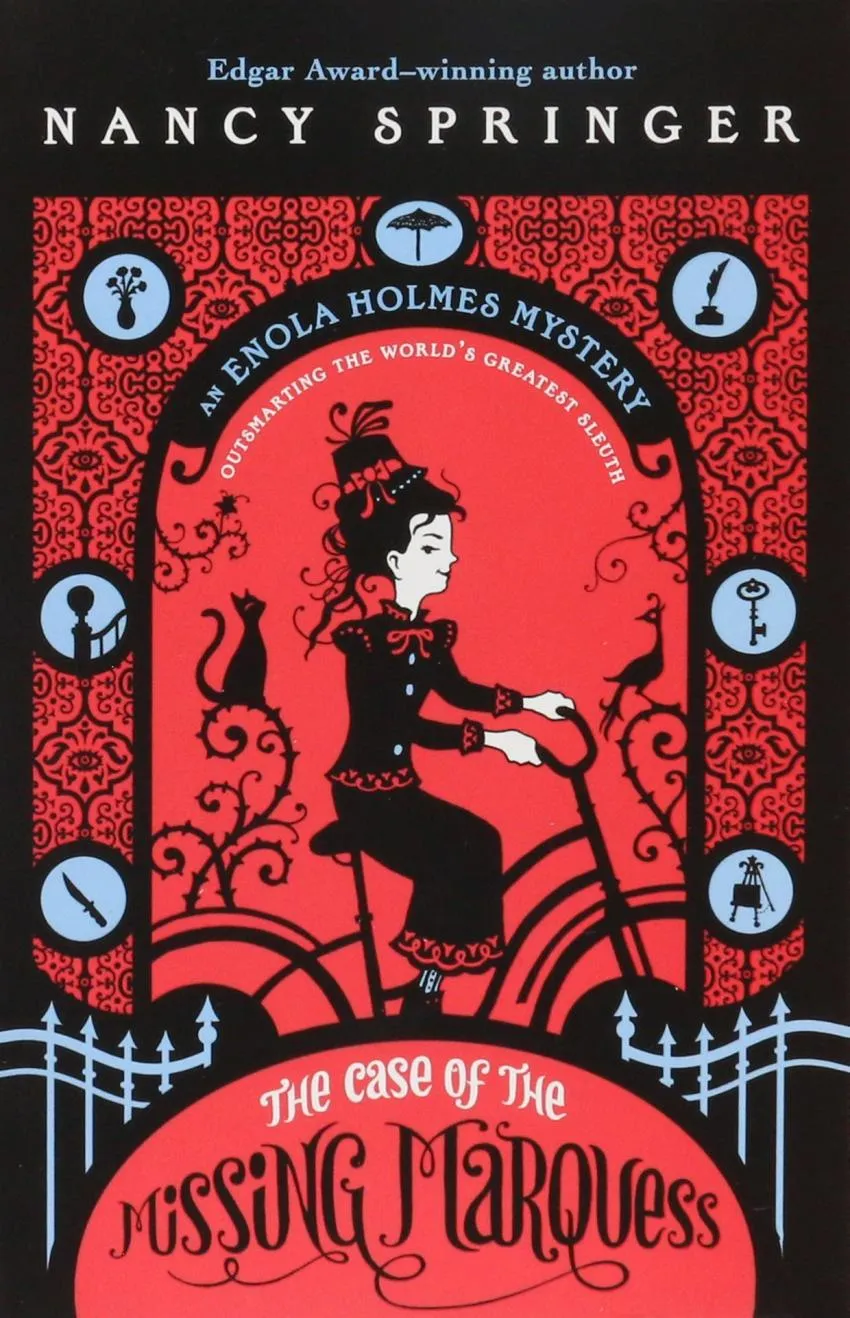Netflix's 'Enola Holmes': A Fresh Take On The Universe Of Sherlock Holmes

Sherlock Holmes, the creation of writer and physician Sir Arthur Conan Doyle, appeared in the landscape of English literature in 1887 when Doyle published A Study in Scarlet. Ever since Sherlock has been a staple in popular culture with new adaptations and re-tellings of his stories coming out in generational intervals. While in the 21st-century alone we've had several come out, from the modern TV adaptations such as Sherlock and Elementary to blockbuster films starring Robert Downey Jr., Sherlock still holds a powerful presence in the generations that followed his late 19th-century debut.
However, the newest take on his universe doesn't even revolve around the genius of deduction at all (played by Henry Cavill); Instead, we follow the tale of his 16-year-old sister, Enola Holmes. While not originally from Doyle's own canon, her story takes the world of Sherlock Holmes and gives it a timeless feel as both a coming-of-age story and a period piece on historic events that are still relevant in today's society.

Enola Holmes first appeared in The Case of the Missing Marquess by Nancy Springer in 2006. An Edgar Award-winning novel, it was followed by five other books, with the fifth title, The Case of the Cryptic Crinoline, also winning the award. Clearly, there's something about the character that enraptures an audience, especially considering the fact that Netflix has just released a film adaptation of the first novel, simply titled Enola Holmes, on September 23rd, which was met with very positive critical reviews.
So, what is it about Enola Holmes that refreshed a canon well over 100 years old?
1. A Lively Side to the Time
The youthfulness of the movie's protagonist (portrayed by Stranger Things star Millie Bobby Brown) is certainly a charming feature to the movie itself, as we see another side to Holmes' England through the lens of a girl growing up in the late Victorian countryside full of life; flowers, forests, green hills, and an eccentric little family of a mother and daughter made the movie begin on a bright note. Other adaptations and the original material itself tend to focus on the grimy and dark London streets as the main setting, so seeing such life and color makes the movie feel different tonally from its shadowy counterparts.
2. Femininity
For a story set in early 1900s England, Enola's womanhood never once became an obstacle. She's intelligent, brave, and combat-savvy thanks to her mother's teachings and could hold her own against an assassin, armed with only her fists and wits. She even outsmarted the world's greatest detective. Oftentimes we see so many women in literature and fiction portrayed as someone strong despite being a woman, but Enola is a genuine example where femininity is embraced within a character. So what she didn't want to go to finishing school? She didn't need it. Being a woman simply wasn't an issue for her.
3. Social Justice
The movement for women's suffrage was an interesting surprise in the world of Sherlock Holmes, but its inclusion was a much-needed one. Sherlock Holmes has always been a rather apolitical character, with no interests in other people or government unless it had something to do with solving his case. Yet his meeting with Edith made him realize that he simply wasn't interested in politics because as a white man, he lived in a world already well-suited to him. All of the women in this story had to work around society to get where they needed to go, and the story proves this by revolving around women's suffrage is its central point of action. The dawn of the 20th century was the beginning of the end for the male-dominated world, and change was spreading everywhere.
4. Romance Who?
Viscount Tewkesbury, Marquess of Basilwether, played by Louis Partridge, is a runaway who Enola meets and works with as the two flee their families. Generally, this would be ringing alarm bells for an impending young teen romance, but surprisingly, the movie doesn't make it turn into anything other than a strong friendship by the end of the film, with some hints dropping for a potential future romance. For now, however, we're left with a sweet relationship that doesn't take away from Enola's own achievements in the film.
5. Sherlock Himself!
Sherlock is famous for his rather cold and calculating approach to life. Solving mysteries all of the time while being a genius at deduction doesn't leave room for emotions, even within his own relationship with his brother and mother. Yet, by the end of this film, he's absolutely glowing with emotion and pride for Enola beating him to solve the case. He cares for his youngest sister and looks fondly upon his memories of seeing her as a child. While this is definitely a notable change, it's a believable shift in personality for him to take. It's a welcomed evolution to his character and shows how he is as human as any other person.
Enola Holmes is available on Netflix and is certainly a treat to watch for anyone interested in a new take on the world of Sherlock Holmes.
Opinions and Perspectives
I absolutely loved how this movie brought a fresh perspective to the Sherlock Holmes universe. Millie Bobby Brown was perfect as Enola!
The Victorian countryside scenes were such a beautiful change from the usual dark London streets we see in Sherlock adaptations.
Not sure how I feel about Henry Cavill as Sherlock. He seemed too emotional compared to traditional portrayals.
Actually, I think Cavill's warmer take on Sherlock made sense given it's from his sister's perspective. It showed a different side of him we rarely get to see.
The women's suffrage subplot really made the story relevant to modern audiences. I appreciated how they wove that into the narrative.
They did such a wonderful job balancing the period setting with contemporary themes. The fourth-wall breaks were particularly clever.
I was worried this would be just another teen drama, but it really respected the source material while doing its own thing.
The relationship between Enola and Tewkesbury was refreshing. Nice to see a friendship that didn't immediately turn romantic.
Having read Nancy Springer's books, I think they did justice to the source material while making it accessible to new audiences.
The fight scenes were surprisingly well done. I loved how they showed Enola's combat training as part of her education.
Am I the only one who found the direct-to-camera narration a bit jarring? Took me out of the period setting sometimes.
The narration actually made it more engaging for me. It helped establish Enola's personality right from the start.
Helena Bonham Carter was underused in my opinion. I wanted to see more of her character's backstory.
This movie proves you can tell an empowering story without diminishing male characters. Everyone had their moment to shine.
Honestly, I found it too modern in its approach. Some of the dialogue felt out of place for the time period.
The mystery wasn't as complex as traditional Sherlock Holmes cases, but it worked well for the younger target audience.
I think the simplicity of the mystery allowed more focus on character development, which was the real strength of the film.
Those countryside scenes reminded me why I love period dramas. The attention to detail was incredible.
Brown's performance really carried the movie. She brought such energy and wit to the role.
I actually preferred this to some recent Sherlock adaptations. It felt more fresh and original.
The costume design deserves more recognition. Each outfit told its own story about the characters.
Sam Claflin as Mycroft was perfectly insufferable, exactly as he should be.
Anyone else catch all the little references to the original Sherlock Holmes stories? They were quite subtle.
The pacing was spot on. It never felt slow despite being over two hours long.
My daughter loved it and now she's interested in reading the original Sherlock Holmes stories. Win!
The scene where Enola outsmarts Sherlock was brilliant. Showed she's just as capable as her famous brother.
Really hoping they adapt more of the books. There's so much potential for a series.
The way they handled historical issues without being preachy was impressive.


